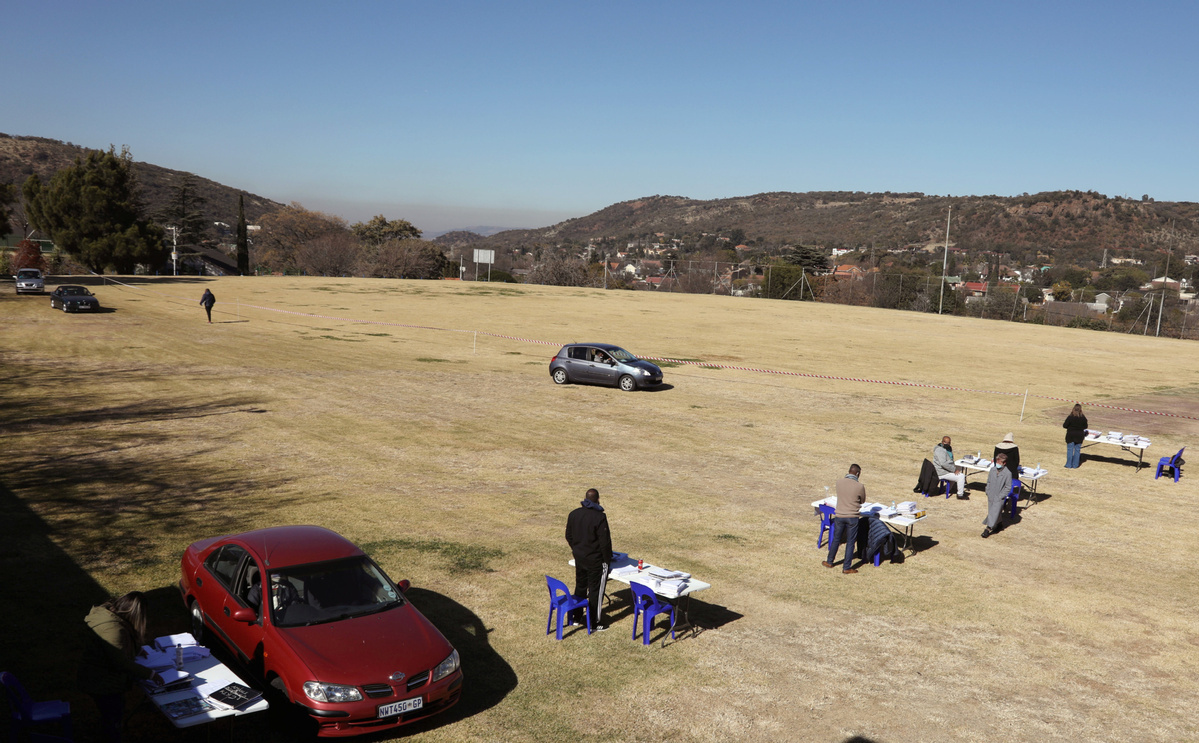
Teachers wait for parents to drive-through as they fetch school work and Term 1 reports for their children, amid the spread of the coronavirus disease (COVID-19) at Mondeor High School, south of Johannesburg, South Africa June 13, 2020. [Photo/Agencies]
The World Health Organization has raised concerns that the extraordinary and prolonged school closures across Africa aimed at keeping students safe from the coronavirus are harming them in many ways. The world health body which released the statement on Aug 20 urged African governments to promote the safe reopening of schools while taking measures to limit the spread of the virus.
According to a survey conducted by WHO and UNICEF, the impact of extended education disruption is significant and includes poor nutrition, stress, increased exposure to violence and exploitation, childhood pregnancies, and overall challenges in the mental development of children due to reduced interaction.
Even though African governments have been gradually easing restrictions and reopening their economies, most of them have not found the right formula to reopen schools with some countries closing the schools after initial reopening and some postponing learning to later dates.
In Kenya, where schools have been closed until next year, George Magoha, the Education Cabinet Secretary, cast doubts about school reopening.
Speaking on Aug 19, Magoha said that more than 100,000 schools will remain closed across the country until adequate preparations have been put in place to ensure full compliance with the guidelines on COVID-19 and the president feels it is safe to take the risk.
In South Africa, the department of basic education released a revised calendar for the 2020 school year, which will see schools reopening on Aug 24. In a statement released on Aug 1, the department said that it had reached the decision after consultations with stakeholders. This came after Cyril Ramaphosa, South Africa's President, closed schools on July 24 after an initial reopening led to a rise in infections among students and teachers.
According to the WHO survey on Sub-Saharan African countries, schools are fully open in only six countries, closed in 14 countries and partially open in 19 others. Around 12 countries are planning to resume classroom learning in September, which is the start of the academic year in some countries.
Matshidiso Moeti, WHO Regional Director for Africa, said that Africa should not be blind-sided by its efforts to contain COVID-19 and end up with a lost generation.
"Just as countries are opening businesses safely, we can reopen schools. This decision must be guided by a thorough risk analysis to ensure the safety of children, teachers and parents and with key measures like physical distancing put in place," Moeti said.
She added that schools have paved the way to success for many Africans and provide a safe haven for many children in challenging circumstances to develop and thrive.
The survey also revealed that the long-term social and economic impact of extended school shutdown is also concerning. According to World Bank modeling, school closures in sub-Saharan Africa could result in lifetime earning losses of $4,500 per child. This may also be worsened by reduced earnings by the parents who are forced to stay at home to take care of the children, especially in households that cannot afford child care services.
To assist African governments in formulating reopening strategies, WHO, UNICEF and the International Federation of Red Cross have issued guidance on COVID-19 prevention and control in schools.
The guidance includes recommendations for physical distancing measures such as staggering the beginning and end of the school day, canceling school events that create crowding, spacing desks when possible, providing hand-washing facilities, wearing masks, discouraging unnecessary touching, and ensuring that sick students and teachers stay at home.


